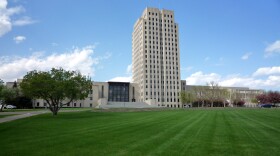North Dakota's Chief Investment Officer said the Legacy fund lost value during the market downturn in March and April.
But David Hunter said it has recovered, and is now close to where it was before that downturn.
Hunter told the Legacy and Budget Stabilization Fund Advisory Board the Legacy fund peaked in mid-February at just over $7 billion.
"Given the strong capital market and economic conditions at the time, including over $1 billion in net investment income in 2019, the fund did well," Hunter said.
But Hunter said the fund lost 12.6 percent during the first quarter of 2020, due to the impact of the global pandemic. He said at that time, the state Investment Board adopted an “equity overlay” strategy, so some money was shifted. into equities. Hunter said in May, the market recovered, and that overlay was lifted. Now, he said the Legacy Fund is now down by only 1.3 percent.
"And after incorporating the estimated returns for the month of May and the first half of June, we believe the Legacy Fund will have an estimated market value of $6.9 billion," Hunter said.
As far as the state’s Budget Stabilization Fund, Hunter told the Board the fund suffered some losses in March, but has recovered, and is now at $724 million. It’s capped at $726.5 million. Money above that amount goes into the state's General Fund.
Changes in defining earnings from the Legacy Fund?
Legislators are talking about a change in the definition of proceeds from the state’s Legacy Fund.
The proceeds go into the state’s General Fund.
Senate Majority Leader Rich Wardner (R-Dickinson) is a member of a Legislative interim committee looking at the uses for those proceeds. He said right now, earnings as defined in statute are the dividend and interest earnings of the fund.
"We never know what that's going to be, until June 30th, the end of the biennium," Wardner said. "beacuse that's always in flux, it's really tough to budget."
So Wardner said lawmakers are looking at changing that definition, so the earnings become a percentage of market value.
"You take the prinicple, and you take a five-year average of the principle balance, and you say, 'Okay -- we're going to take four percent of that, and that's what we're going to expend as income," Wardner said.
Wardner said that’s how the earnings of the Common Schools Trust Fund are calculated, with that money going into foundation aid.
"The percent of market value of the fuind does not change as much as the earnings do," Wardner said. "So, that gives us some stability, and allows us to plan and budget."
Wardner said right now, interim committees are looking at a figure of 3 ½ to 4 percent.




